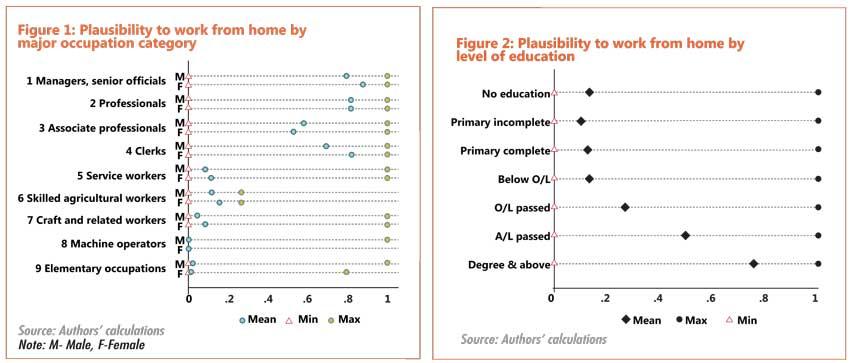Reply To:
Name - Reply Comment
Last Updated : 2024-04-20 00:00:00

 The COVID-19 pandemic which was first reported in Sri Lanka in January 2020 has distressed the country’s labour market. According to the Department of Census and Statistics, with the onset of the pandemic, the labour force participation has decreased and the unemployment rate has increased, indicating reduced job openings.
The COVID-19 pandemic which was first reported in Sri Lanka in January 2020 has distressed the country’s labour market. According to the Department of Census and Statistics, with the onset of the pandemic, the labour force participation has decreased and the unemployment rate has increased, indicating reduced job openings.
For example, the labour force participation rate decreased from 51.1 percent to 50.2 percent and the unemployment rate increased from 4.6 percent to 5.4 percent from second quarter (2Q) 2018 to 2Q 2020. This is partly due to the measures taken since mid-March to contain the spread of COVID-19 through curfews and lockdowns.
To continue economic activities under such constraints, the Sri Lankan government advised full or partial work from home (WFH) policies. For many businesses and workers, WFH practices are a new experience.
Further, not all workers are able to effectively carry out WFH (Saltiel, 2020). The practicality of WFH depends on three main factors. One, the nature of the work and the possibility of conducting job-related activities from home.

Two, the capability of the management and workers to adapt to WFH. Lastly, the availability of information and communications technology (ICT) infrastructure and access to the internet for both the workers and businesses.
Better information on the types of workers who are able to continue to carry out their tasks from home can help the government to design policies to reduce disruptions to economic activities. This article examines the plausibility to WFH for different types of workers in Sri Lanka.
COVID-19 and ‘new normal’
Labour market disruptions induced by COVID-19 is not unique to Sri Lanka. According to the International Labour Organization (2020), around 68 percent of the total workforces, including 81 percent of employers, live in countries with recommended or required workplace closures.
As per ILO estimates, just 18 percent of workers have occupations suitable for WFH and reside in countries with the infrastructure necessary to enable this practice.
These statistics indicate that the numbers of occupations that are affected or minimally affected by social distancing measures are large, while the majority of occupations cannot be performed from home.
According to Dingel and Neiman (2020) and Mongey and Weinberg (2020), even in advanced countries with very good ICT infrastructure coverage such as the United States, only 37 percent of jobs can practically be performed entirely at home, although there are substantial differences across cities and industries. Besides, a country-specific result indicates that countries with lower income levels are less likely to adapt to WFH mode, resulting in a lower share of jobs that can be performed at home.
In an attempt to assess the plausibility to WFH, Dingel and Neiman (2020) classified occupations based on information gathered from surveys.
The plausibility factor was determined based on the physical and social factors that influence the nature of work (e.g., frequency of using e-mails, frequency of job related out-door activities, etc.) as well as tasks performed at work (e.g., handling vehicles, controlling machines, working directly with public, etc.).
By mapping the plausibility to WFH shares compiled by Dingel and Neiman (2020) to Sri Lanka’s Labour Force Survey data, it is possible to assign plausibility to WFH shares to occupations in the country.
The ability to WFH varies between 0 and 1, where 0 indicates occupations that cannot be done from home at all, while 1 indicates occupations that can entirely be done from home. Occupations that can be partially done from home are indicated by a number between 0 and 1, where a number closer to one indicates an occupation that can mostly be done from home, while a number closer to zero indicate an occupation which can minimally be done at home.
The results show that on average (see mean values of Figure 1), the ability to WFH vary widely across occupational groups. Further, the plausibility to work from home is more for females than for males. This is possible due to the fact that women choose desk jobs. The data also clearly shows that workers in occupation groups requiring low skill levels are less able to WFH, while workers in high-skilled occupation groups are more able to WFH. However, other than for workers in skilled agriculture, at least some workers in all other occupation categories can work remotely.
Figure 2 shows how plausibility to WFH varies by skill level. As seen, workers with at least a degree are most able to WFH. While the plausibility to WFH decreases for workers with lower levels of education.
The above analysis illustrates the plausibility to WFH for different types of workers in Sri Lanka. However, the actual number of workers who can WFH will not only depend on the work context and the nature of the job, it will also depend on the ability of the management to organise work so workers are able to WFH as well as their access to ICT infrastructure.
Way forward
The government can improve WFH activities by supporting firms to organise WFH, and by improving access to WFH. As mentioned earlier, the nature of work and job-related activities only provides the plausibility of workers to WFH. For workers to actually WFH, managers of institutions must facilitate this by organising online reporting and monitoring mechanisms. Given that the concept of offsite work is new to Sri Lanka, not all managers will have the knowledge to facilitate WFH opportunities for their workers. The government can design policies to support such institutions.
The results also suggest that facilitating WFH may be a way to increase female labour force participation, as they have a higher likelihood of WFH. Further, access to ICT infrastructure and fast connectivity are essential to effectively WFH.
Reducing gender inequalities in access to ICT can also improve economic activities under WFH, and increase female labour force participation. Moreover, policies to improve the coverage of good quality ICT infrastructure can also increase the effectiveness of WFH.
Meanwhile, given the nature of employment, workers in some occupations will find it challenging to WFH, and alternative strategies must be used to keep these workers active. Some examples of such strategies include working under strict social distancing measures and providing better protective gear to mitigate health risks.
(Nisha Arunatilake is the Director of Research at IPS. Her research interests include Econometrics and Economic Modeling, Education, Health, Labour & Migration, National Government Expenditures, Poverty and Development Policy, Social Security and Public Pensions, Taxation, Subsidies, and Revenue. She holds a BSc in Computer Science and Mathematics with summa cum laude from the University of the South, USA and an MA and PhD in Economics from Duke University, USA. Talk with Nisha – nisha@ips.lk Chamini Thilanka was a Research Assistant at IPS. She holds a BA and an MA in Economics from the University of Peradeniya. She is a Visiting Lecturer at the Open University of Sri Lanka).

Add comment
Comments will be edited (grammar, spelling and slang) and authorized at the discretion of Daily Mirror online. The website also has the right not to publish selected comments.
Reply To:
Name - Reply Comment
On March 26, a couple arriving from Thailand was arrested with 88 live animal
According to villagers from Naula-Moragolla out of 105 families 80 can afford
Is the situation in Sri Lanka so grim that locals harbour hope that they coul
A recent post on social media revealed that three purple-faced langurs near t